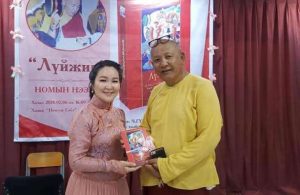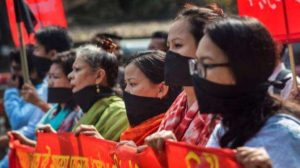
It is difficult not to admire the candor of the Centre of Buddhist Studies’ Director at Hong Kong University. Last year, Venerable Hin Hung had hosted an upbeat seminar about Buddhism’s potential in the 21st century. Yet when our team met him in his office in March, he cut a much more sober and complex picture of Buddhism’s difficulties and possibilities.
“Developments are uncertain,” he reflects. “The rise of the internet has certainly democratized and popularized Buddhist learning. The problem is that there’s no authority to verify what’s online, and ultimately, collecting information from the Internet cannot replace learning and taking refuge under a master. The sangha element is missing.”
I am reminded of the proliferation of well-meaning proverbs, almost all made up, that are falsely attributed to the Buddha all over social media. The advantage of learning under a sangha rather than from Facebook would be obvious here. But what happens if the sangha isn’t there for you? This, for Ven. Hin Hung, is the main issue. “The role of preceptors is declining, and while blind deference to authority is no longer seen as a virtue, greater freedom has presented new challenges for Buddhist students of today,” he says. The Buddhist Association of China estimates that there are about 220,000 government-registered monastics in the country. In the world’s most populous country, that is a troubling number.
“We’re encountering Buddhists who collect blessings and empowerments for its own sake, or take refuge under not only multiple masters, but masters of the Theravada, Mahayana, and Vajrayana traditions. These masters have contrasting views of the path to enlightenment. Or look at Tibet. Rapid modernization is gradually de-incentivizing families to send their sons to monasteries. Why go to a monastery when you can go to university? Why become a lama when you can become an entrepreneur or hotel manager? Tibetan Buddhism will soon need to deal with the problems that we are facing today.”
Ven. Hin Hung pauses briefly. “But it’s the condition of the sangha that is of greatest concern. The critical problem Buddhism in the world faces is a lack of monastics. The less monastics there are, the less likely people can find legitimate masters to learn, take refuge and precepts under.” And without enough monks, how can an abbot fill his temples? How can he facilitate activities that attract younger generations to the Dharma?
This leads Ven. Hin Hung into an even broader bird’s eye view of modern Buddhism: the fact that the dominant perception of Buddhism in the West is one that is focused on mindfulness, psychotherapy, the present moment, and benefits for “this life”. Perhaps in order to adapt Buddhism to the worldly, scientific, and empirical concerns of the West, eminent masters in Europe and North America have created a modernist Buddhism that has monopolized the popular perception of Buddhism. In many ways, this is the next step for the Buddhist modernism that had been evolving since the 1800’s. David McMahan’s seminal thesis on Buddhist modernism was mindful of this conscious creation of a Buddhism adapted to modern sensibilities, the long-term consequences of which Ven. Hin Hung is still unsure.
The current complications in Chinese Buddhism have, as with everything, a historical context. The Cultural Revolution left a decades-long absence of dissemination and intellectual life. The One Child Policy was an economic disincentive for families to send sons to monasteries, contributing to a shrinking sangha. Taiwan, by contrast, flourished with several incredibly influential institutions, most notably Master Xingyun and his Fo Guang Shan order (Francesca Tarocco, The Cultural Practices of Modern Chinese Buddhism, 2007, p. 134). Yet for all its adaptability and vitality compared to the Chinese mainland, Buddhism in Taiwan (despite enjoying leaders like Master Xingyun or Master Sheng Yen) could not shape the global narrative of Buddhism with the same influence as the Dalai Lama, other Tibetan masters, Thich Nhat Hanh, or even Jon Kabat-Zinn. There was the reality that Chinese was not an international language like English, but Ven. Hin Hung has an even starker theory: the Buddhism being propagated from Taiwan was Pure Land Buddhism.
“The dominant idea of Buddhism in the West, and therefore internationally, is one that does not focus on the afterlife, for rebirth or karma, or soteriology,” observes Ven. Hin Hung. “Yet all these things are what the Pure Land tradition emphasizes. This new vision of ‘present-moment’ Buddhism, which is amplified by figures like Thich Nhat Hanh, is one of personal growth and psychotherapy, not the traditional kind of religion that speaks of salvation. Modern Buddhism doesn’t care about the Dharma-ending age. Yet this is the eschatology that Pure Land Buddhism hinges on.”
He is frank with me: there is a very limited international market for traditional Pure Land Buddhism. “Pure Land has a complex theology and solid rationale, but it is at heart a devotional tradition. Many in the West who turn to Buddhism are actually trying to escape the doctrinal obligation that devotional traditions have. If they were really devotionally inclined, most wouldn’t need a foreign faith like Pure Land. They’d just go back to Christianity.” Some Western-born seekers do find Pure Land doctrine more attractive than Christianity. Some even become ordained in the Pure Land transmission. Two examples would be my friend Ven. Zhi Sheng, whose secular name is Malcolm Hunt, and Ven. Wuling, an American-born nun. For most, however, the new zeitgeist of Buddhism as scientific, self-oriented, and non-devotional is much more appealing.
Ven. Hin Hung is not criticizing the Western understanding of Buddhism at all. In fact, he admires many elements of it. “Pure Land Buddhists should adopt Thich Nhat Hanh’s slogan, ‘The Pure Land is here and now’ for marketing purposes,” he offers wryly. The Vietnamese master offers a very “Zen” interpretation of Pure Land, but it might help to improve the relatively weak cultural influence Chinese Buddhism has had in the West, compared to Japanese, Tibetan, and Theravada Buddhism. “It might not be ‘traditional’, but if faith-based Pure Land is to carve itself a place in the consciousness of the West’s dominant perception of Buddhism, you’ll need to bring the transformation of the heart into the center of your theology: xin (心),” explains Ven. Hin Hung. “The transformation of xin is at least possible for all Buddhists.”
It is not scripturally invalid to present the Pure Land as the ultimate reality suffusing this life. Pure Land Buddhism is, after all, panentheistic (the belief that the divine interpenetrates the entire cosmos and extends timelessly beyond it). It was Master Huijing (慧淨法師) who declared: “Amitabha Buddha always places himself above the heads of reciters, protecting them day and night. He takes care of them and supports them all the time… He redeems all the karmic obstructions we accumulated in our past lives… it is Amitabha who is asking us to allow him to protect and save us” (The Benefits of Amitabha-Recitation In Our Present and Future Lives, translated by Householder Guoshu). The Infinite Life Sutra assures us that Amitabha “sees all sentient beings as his own self.” Perhaps some panentheistic marketing on Amitabha’s behalf is overdue.
It has been a roller-coaster ride of an afternoon. It is a sobering if exciting overview of Buddhism’s current circumstances among the world’s great faiths. There are no easy solutions. “We cannot stop the tide. We cannot change the zeitgeist,” concludes the jokingly self-confessed part-time monk (as busy as he is with administrative and teaching duties). There is a degree of caution but also a degree of relief. His words are sobering, but he is smiling. “There is only so much we can and should push ourselves to do. We simply follow the times and try to make it more meaningful and wholesome. That’s it!”
Then perhaps, one day, a charismatic, enlightened standard bearer for Pure Land Buddhism might be able to shape a new narrative like major teachers in the West – just like the Dalai Lama and Thich Nhat Hanh have done.












